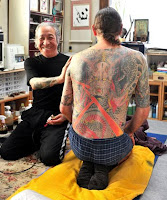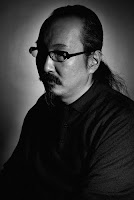 A couple of articles from The Japan Times have caught my eye recently. First was Tattoo as art on human canvases, which focuses on the work of Horiyoshi III but also briefly looks at the history of tattoos and tattoo culture in Japan. I have some ink myself, so I found this article to be particularly fascinating. The second article was Japanese whiskeys get foothold in U.S. I and those I live with are huge whiskey fans although they are much more knowledgeable than I will ever be. I’ve heard good things about some Japanese whiskeys, and in general they are starting to gain a bit more respect. I have yet to actually try any, but I certainly would like to.
A couple of articles from The Japan Times have caught my eye recently. First was Tattoo as art on human canvases, which focuses on the work of Horiyoshi III but also briefly looks at the history of tattoos and tattoo culture in Japan. I have some ink myself, so I found this article to be particularly fascinating. The second article was Japanese whiskeys get foothold in U.S. I and those I live with are huge whiskey fans although they are much more knowledgeable than I will ever be. I’ve heard good things about some Japanese whiskeys, and in general they are starting to gain a bit more respect. I have yet to actually try any, but I certainly would like to.
Deb Aoki, with additional commentary by Robin Brenner (who I had the pleasure of seeing at the 2010 American Library Association Annual Conference), has posted a list of 50 Essential Manga for Libraries over on About.com: Manga. The list emerged as part of the discussion about why Libraries Are Not The Same as Manga Scanlation Sites. As a librarian I was particularly interested in seeing what would make the cut and why and as a manga reader I was curious to see which ones my library already owned. There’s a little bit of something for everyone—popular series, classics, as well newer works. I’ve at least heard of if not read most of the titles, but it’s an interesting and useful list.
And speaking of lists, The Japan Society has posted a Japan-related reading list on their blog—Summer Reads: Some Are Japan. It has a good mix of fiction and non-fiction materials and even includes Osamu Tezuka’s manga, Buddha. I own a few of the books on the list (I’m currently working my through Royall Tyler’s translation of Murasaki Shikibu’s The Tale of Genji) but there are several others that I’ll be adding to my reading pile.
Over at Soliloquy in Blue, Michelle Smith and Melinda Beasi have started a new monthly feature called Let’s Get Visual in order to improve their critiquing of the visual aspects of manga. In their first installment they take a look at the third volume of Rei Hiroe’s Black Lagoon and the fifteenth volume of Takeshi Obata and Yumi Hotta’s Hikaru No Go. I’m excited for this series since I personally find artwork difficult to review and I hope that I might be able to learn a thing or two as they work it out themselves.
I have no idea how I missed the fact that a film had been made from Osamu Tezuka’s very dark but very excellent manga MW. Fortunately, Serdar Yegulalp posted his reactions over on Genji Press. Now I just need to figure out how to track down a copy that I can actually watch.

